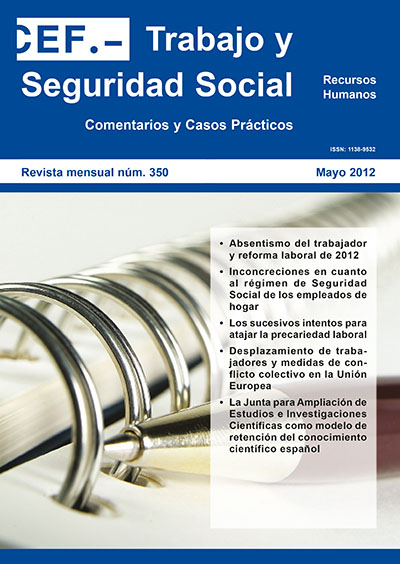Termination of the work contract due to absenteeism after the 2012 labour reform
DOI:
https://doi.org/10.51302/rtss.2012.3403Keywords:
absenteeism, dismissal, absence from work and inapplicable leave of absenceAbstract
After Law 35/2010 reduced the total workplace absenteeism rate required to terminate a worker's contract on grounds of absenteeism from 5 to 2.5%, Royal Decree-Law 3/2012 has completely eliminated this requirement. This reform has therefore consisted mainly in facilitating termination of contracts for this reason by means of the «easy» system of eliminating the total workplace absenteeism rate previously required. It was widely considered that this requirement had been responsible for the low effectiveness of this reason for terminating contracts. The labour reform of 2012, however, does not address in depth the legal basis and regime of absenteeism as grounds for terminating an employment contract for objective reasons. Nor does it address the complex issues that arise in the practical application of the Law, or measures that could be taken to reduce absenteeism without having to resort to what should be the last and most traumatic measure: termination of the employment relationship. In short, once again, the emphasis has been placed on a purely punitive treatment of absenteeism rather than on taking a more preventive approach.
In this study we aim to analyse the legal regime of this reason for terminating contracts, taking into account not only the changes introduced by Royal Decree Law 3/2012 but also the aspects of the Law that have not been changed but are difficult to understand and therefore hinder its application. Because these aspects limit the Law's efficacy, they should perhaps have been dealt with in the reform.
Supporting Agencies
Este trabajo se enmarca en el proyecto de investigación DER 2010-21686-C02-02 concedido por el Ministerio de Ciencia e Innovación que lleva por título «La gestión del absentismo laboral: medición, impacto económico, causas sociales y psicológicas y régimen jurídico laboral». El autor es miembro del grupo de investigación consolidado de la Generalitat de Cataluña «Análisis social y organizativo» (2009 SGR 310)



















